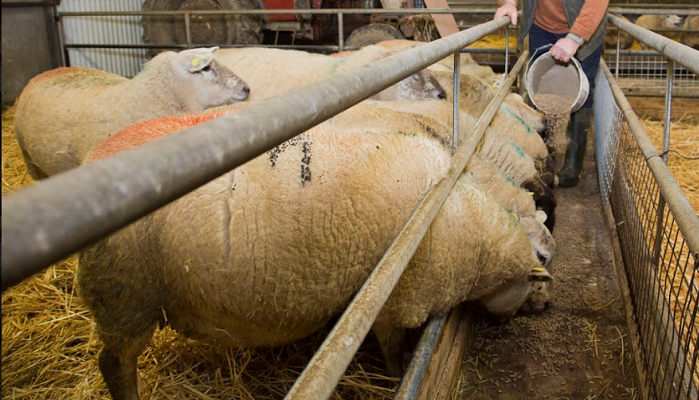27 February 2023
Bypass protein and its role in colostrum production

The final preparations for lambing are underway for many March-lambing flocks, and the inclusion of rumen bypass protein is important to ensure adequate colostrum production at lambing time.
Dr Frank Campion, Research Officer in Teagasc Athenry, featured in a recent Let’s Talk Sheep webinar, where he highlighted its importance.
“In terms of protein digestion in pregnancy, it’s really all about the final three weeks pre-lambing and it’s all about the quality of the protein,” Frank explained. “If you have a good quality silage and a decent ration, your crude protein content will be generally fine, but what you need to be careful of in the last couple of weeks is that the ewe is getting enough rumen bypass protein.”
In terms of the protein coming from forage, Frank outlined: “no matter how high it is, it will be insufficient to meet these requirements close to lambing.” To ensure ewes are provided with sufficient protein prior to lamb, he recommended the inclusion of soya bean meal as it “will have the best available digestible undegradable protein or rumen bypass protein.”
This is a protein which bypasses the digestion processes of the rumen and is available in the small intestine. Once it has reached the small intestine, it is then absorbed as amino acids, which helps with the ewe’s mammary gland development, which is important for the availability of colostrum at lambing time.
On the quantities of soya offered, Frank explained: “Generally, what we’d say is she should be getting roughly 100g per scanned lamb of soya in the final three weeks pre lambing. Your twin-bearing ewe should be getting roughly 200g of soya, be it through the ration – or if your ration is particularly poor and doesn’t have soya – being topped up on top of it for the final couple of weeks pre-lambing.”
Frank also highlighted previous research work he undertook looking at the levels of colostrum production across various breeds of ewe, noting that protein supplementation has a big effect on the colostrum produced. Of the ewes studied, an average colostrum production of 529ml was recorded, however, this ranged from 20ml/ewe right up to 2,000ml/ewe.
“If you have your pregnancy nutrition correct, you should be able to get most of your ewes producing enough colostrum,” he commented.
Full recording
The full recording of the Let’s Talk Sheep Webinar, which focused on the nutrition of the ewe pre-lambing, is available below. Damian Costello, Teagasc Sheep Specialist was joined by Dr Frank Campion, Teagasc and Shane Moore, BETTER Farm Sheep Programme Participant, Co. Roscommon to discuss the nutrition of the ewe pre lambing.
Nutrition of the pregnant ewe plays an important role in the successful outcome of parturition and subsequent ewe and lamb performance. In this webinar, the panel outlined what are the key components of a flock nutrition programme in the run up to lambing and what are the pitfalls to look out for.
